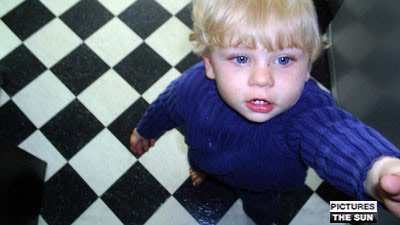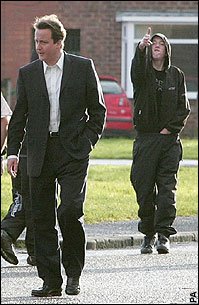 It would be nice to imagine that the fairly restrained coverage so far over the case of the father who abused and raped his two daughters for the best part of three decades is out of embarrassment at the tidal wave of judgemental coverage earlier in the year over Josef Fritzl. Our finest media denizens, after all, informed us that such a level of abuse going unnoticed was the kind of thing that could only happen in a closed, post-authoritarian society where questions go unasked, secrets remain secrets and cellars are permanently closed. Lorraine Kelly, getting into the spirit of such things, suggested that the Austrian police "should start arming themselves with pickaxes, torches and strong stomachs and start searching those cellars". The Daily Mail is even referring to the father as the "British Fritzl", as though his reign of terror, which lasted longer than Fritzl's, was somehow inspired or just our version of Austria's national shame.
It would be nice to imagine that the fairly restrained coverage so far over the case of the father who abused and raped his two daughters for the best part of three decades is out of embarrassment at the tidal wave of judgemental coverage earlier in the year over Josef Fritzl. Our finest media denizens, after all, informed us that such a level of abuse going unnoticed was the kind of thing that could only happen in a closed, post-authoritarian society where questions go unasked, secrets remain secrets and cellars are permanently closed. Lorraine Kelly, getting into the spirit of such things, suggested that the Austrian police "should start arming themselves with pickaxes, torches and strong stomachs and start searching those cellars". The Daily Mail is even referring to the father as the "British Fritzl", as though his reign of terror, which lasted longer than Fritzl's, was somehow inspired or just our version of Austria's national shame.
Granted, Fritzl's was just one of three cases emerging from Austria which involved the locking up and abuse of children, although one of those was something of a stretch as it involved a mentally ill mother imprisoning her sons, rather than the more sickening caging of young women for years on end, as occurred in the Natascha Kampusch case. Even so, the coverage was predicated on the idea that this was the sort of thing that didn't and couldn't occur in own backyard, and also showcased our own understandable obsession, some would suggest even fetish for extracting every drop of retribution out of those countries which turned fascist, especially ones which have not quite faced up to their past in the way that Germany itself has, with the Nazi angle being played up as an explanation for why Fritzl became the man he did. Admittedly, he himself used it as an excuse, and that is often enough for the more lazy among us to conclude that must have been it, especially if the person themselves says so.
This though always reflected a rather deceitful decision to overlook our own "monsters", which every society, regardless of its culture, government or society creates. The ultimate example was Fred and Rose West, where a married couple connived to molest and murder young women, and which we already seem to have almost forgotten. Such crimes, and such individuals are of course extraordinarily rare, but when it came to Fritzl and Kampusch the media tended to overlook that the uncovering of such crimes close together was coincidental rather than indicative of a moral malaise in Austrian society. After all, it made for great copy, and that in our current media climate seems to be far more important than taking a step back and examining such things calmly. We connect and correlate rather than detach and research.
While the coverage yet could step up if further revelations of incompetence or failings emerge in the Sheffield incest case, for want of a better way of describing the crimes committed by the father, as all those involved are quite rightly being protected from the media intrusion which they would come under were they to be named, it doesn't seem likely to reach the critical mass which the Baby P story has undoubtedly reached. This is itself ought to be confusing: without a shadow of a doubt this is a case far more shocking, disgusting and frightening than that involving Baby P. The abuse he suffered went on only for a relatively short period of time by comparison, as did the social services involvement with him. Here we are talking about almost 30 years of continuous abuse, contact with the public services and up to 19 pregnancies, all of which went by without anyone doing enough investigation into who was impregnating two sisters on such a regular basis. Even on the lowest level, the abuse of the two sisters was more insidious than that even inflicted on Elisabeth Fritzl by her father: she was after all imprisoned in the family basement. No such physical manacles prevented the two women in this case from escaping; theirs, to quote Blake, were of the mind forged variety. The terror of their father, and what would happen to them, perhaps even to him, imprisoned them far more ably than the construction which Fritzl developed to constrain his daughter.
One of the reasons why it might well be overlooked is that, after all, the Baby P campaign is still in full swing. The Sun is keeping up the pressure, splashing on it again today. You can only tend to keep one outrage going at a time, in the front of people's minds, about which something must be done. Moreover, because of the nature of the case, there are no faces to which the pain can be attached. It was only once Baby P's face was revealed that the witch-hunt proper swung into action. The best we have at the moment is the almost same digitally altered faces, hiding identities and rendering them inhuman as a result. Also true is that this is not the second case in the same area, as it is with Baby P in Haringey. Then there is, equally obviously, that Baby P, was well, a baby. Unable to defend himself, with his own mother either complicit or involved in his abuse, it rings the alarm bells of almost any society that the youngest and weakest can be so cruelly treated and failed by those who are meant to be there to protect him. Young mothers themselves and especially women seem to have been instrumental in the campaign, especially disgusted that someone like themselves could apparently have been so heartless towards her own offspring, or so detached as to allow such things to happen to him. Some of it can surely be placed down to the maternal instinct, to empathise with the child failed by her own mother. That the empathy does not extend to the social workers involved raises its own questions, who are derided as foolish or stupid for believing lies, with the abuse being so apparently obvious.
Those are the more prosaic reasons. Perhaps the ones closer to truth for why it will fail to have the same impact as Baby P, and I might well be proved completely wrong in this, is that while his death and mistreatment has led all the usual suspects to jump to their pre-ordained conclusions, the abuse of the two daughters in this case has no easy scapegoats to castigate. We're not just dealing with one or two doctors or two or three social workers who must be instantly sacked for all our sakes, but with officials and public servants going all the way back to the 1970s. We haven't got the evil mother who left her husband and shacked up with a simple Nazi, who browsed porn on the internet and played poker while her child suffered, but instead the more familiar abusive father. Likewise also, while even though Baby P was born into what was a dysfunctional if nuclear family, the matter of parentage didn't really matter, as single parents and the apparent loose morals of the mother, or of those like her were condemned even if they were irrelevant. In the Sheffield incest case we appear to have an extended nuclear family, which certain politicians and newspapers inform us is the only real way to bring up children, and that anything else helps contribute towards the broken society. Although benefits may have been involved, with the Mail alluding to the father collecting the child benefit from his incestuous offspring, in Baby P's case the welfare state had quite obviously contributed towards his predicament. Here instead the father seems to have been a local businessman, involved in construction, which helped him to move from place to place, evading suspicion.
Ultimately, it might come down to the fact that it isn't so easy in this instance to blame a "leftie mafia", as Trevor Kavanagh called them. The years of rape began in 1981, two years after Thatcher's victory and sixteen before the Conservatives eventually lost. Even if you want to try to blame Sheffield itself, as Haringey has been, it's not so easy to do so years after the fact, although the red flag did fly briefly from the council building during that time. They also lived in Lincolnshire, which is fairly equally split between Labour and Conservative MPs, while the council is at the moment Conservative. You can't so convincingly, as Melanie Phillips attempted, argue that those really with blood on theirs hands were the "progressive intelligentsia who have simply written orderly, married, normative family life out of the script". Orderly, married, apparently normative family life in this instance covered up the abuse. Accordingly, you can't really say that the "ultimate responsibility lies with them [Labour] and the Guardianistas they have created in every section of public life."
Whilst then we have an apparent mirror image of the Fritzl case, we have none of the soul-searching and introspection that country underwent following the discovery. We are perhaps exhausted from the witch-hunt over Baby P, where the underclass reared its ugly head, benefits were seen to be partially responsible and where the political correctness and naivety of social workers could be blamed for the failure to protect him. The Sheffield incest case ought to be an example of how such abuse and failings can happen almost anywhere, in the most apparently normal of families when viewed from the outside. It ought to suggest that all of our assumptions, whether left-wing or right-wing, can often be proved completely inadequate when it comes to the crunch; that we shouldn't imagine that these sort of things can only be possible in dark, uncaring places such as Austria, or only in the benighted council houses of Tottenham. All of this really ought to be just that, apparent. Instead we're so interested in finding someone or something to blame that we skip past the point where we examine why these things happen where they do and how to learn from them. There will always be cases like that involving Baby P, just as there will be those like Josef Fritzl. We create our own monsters, and only by realising that our society and culture as a whole influences them, not just sections of it which we wish to demonise, will we ever be able to move on from the blame game.Labels: abuses by tabloids, Baby P, blame game, child abuse, child protection, hypocrisy, Josef Fritzl, media analysis, media coverage, Sheffield incest case, social workers




